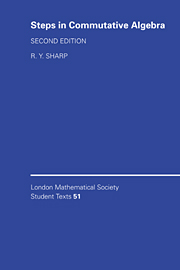Book contents
- Frontmatter
- Contents
- Preface to the 1st Edition
- Preface to the 2nd Edition
- 1 Commutative rings and subrings
- 2 Ideals
- 3 Prime ideals and maximal ideals
- 4 Primary decomposition
- 5 Rings of fractions
- 6 Modules
- 7 Chain conditions on modules
- 8 Commutative Noetherian rings
- 9 More module theory
- 10 Modules over principal ideal domains
- 11 Canonical forms for square matrices
- 12 Some applications to field theory
- 13 Integral dependence on subrings
- 14 Afflne algebras over fields
- 15 Dimension theory
- 16 Regular sequences and grade
- 17 Cohen–Macaulay rings
- Bibliography
- Index
10 - Modules over principal ideal domains
Published online by Cambridge University Press: 06 January 2010
- Frontmatter
- Contents
- Preface to the 1st Edition
- Preface to the 2nd Edition
- 1 Commutative rings and subrings
- 2 Ideals
- 3 Prime ideals and maximal ideals
- 4 Primary decomposition
- 5 Rings of fractions
- 6 Modules
- 7 Chain conditions on modules
- 8 Commutative Noetherian rings
- 9 More module theory
- 10 Modules over principal ideal domains
- 11 Canonical forms for square matrices
- 12 Some applications to field theory
- 13 Integral dependence on subrings
- 14 Afflne algebras over fields
- 15 Dimension theory
- 16 Regular sequences and grade
- 17 Cohen–Macaulay rings
- Bibliography
- Index
Summary
In this chapter, we shall show how some of the techniques we have developed for handling modules over commutative Noetherian rings so far in this book can be put to good use to provide proofs of some ‘classical’ theorems. These theorems concern finitely generated modules over principal ideal domains, and include, as special cases, the ‘Fundamental Theorem on Abelian Groups’ and the ‘Jordan Canonical Form Theorem’ for square matrices over an algebraically closed field.
Basically, the main results of this chapter show that a finitely generated module over a principal ideal domain can be expressed as a direct sum of cyclic submodules, and that, when certain restrictions are placed on the annihilators of the cyclic summands, such decompositions as direct sums of cyclic modules have certain uniqueness properties.
It is perhaps worth reminding the reader of some basic facts about cyclic modules. Let R be a commutative ring. Recall from 6.12 that an R-module G is cyclic precisely when it can be generated by one element; then, G ≅ R/I for some ideal I of R, by 7.25. Since AnnR(R/I) = I and isomorphic R-modules have equal annihilators, it follows that a cyclic R-module is completely determined up to isomorphism by its annihilator.
Next, we give some indication of the general strategy of the proof in this chapter of the fact that each finitely generated module over a PID R can be expressed as a direct sum of cyclic R-modules. The following exercise is a good starting point.
- Type
- Chapter
- Information
- Steps in Commutative Algebra , pp. 185 - 207Publisher: Cambridge University PressPrint publication year: 2001



